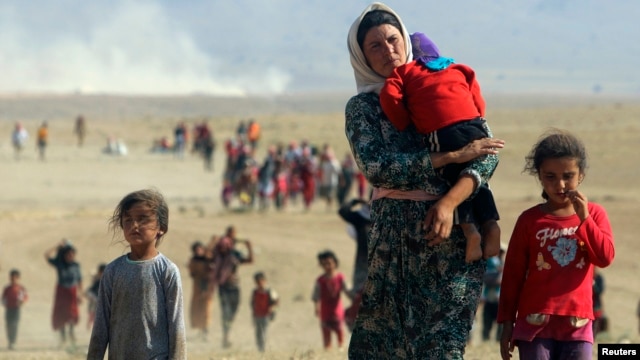Iraq's Yazidis tell Hague court Islamic State committed genocide
| Publisher | Radio Free Europe/Radio Liberty |
| Publication Date | 25 September 2015 |
| Cite as | Radio Free Europe/Radio Liberty, Iraq's Yazidis tell Hague court Islamic State committed genocide, 25 September 2015, available at: https://www.refworld.org/docid/561d04b415.html [accessed 20 May 2023] |
| Disclaimer | This is not a UNHCR publication. UNHCR is not responsible for, nor does it necessarily endorse, its content. Any views expressed are solely those of the author or publisher and do not necessarily reflect those of UNHCR, the United Nations or its Member States. |
September 25, 2015
By RFE/RL
 Displaced people from the minority Yazidi sect, flee violence from Islamic State (IS) militants in the town of Sinjar in northern Iraq in August 2014.
Displaced people from the minority Yazidi sect, flee violence from Islamic State (IS) militants in the town of Sinjar in northern Iraq in August 2014.
Iraq's Yazidis, a minority targeted for particularly brutal treatment by the Islamic State (IS) group, have urged the International Criminal Court (ICC) to investigate the militants for committing crimes of genocide and sexual slavery.
Two Yazidi groups, with the support of Iraq's Kurdish regional government, submitted a report to The Hague-based court documenting their claim that IS "systematically committed atrocities amounting to genocide and that these crimes fall within the jurisdiction of the ICC," said Murad Ismael of the Yazidi rights organization Yazda.
The allegations include summary executions of more than 700 Yazidi men, the killing of the sick and elderly, the rape and enslavement of thousands of women, and the abduction of their children, who are forced to convert to Islam and fight for IS.
IS has openly said it wants to eliminate the Yazidi religion, which it regards as heathen. Yazidis believe in one god and their theology mostly derives from ancient Iranian religious traditions, rather than canonical Jewish, Christian, or Islamic texts.
Earlier this year, ICC chief prosecutor Fatou Bensouda said IS had committed "unspeakable cruelty," including mass executions, rape, and torture. But she said she could not investigate as neither Iraq nor Syria are ICC members.
The Yazidis' report, however, names some 20 foreign IS fighters from countries which have signed the ICC's founding Rome Statute. It says that between 5,000 and 7,500 of such foreigners are fighting for IS.
Bensouda said in April the court could in theory exercise "personal jurisdiction" over individuals from member states who have joined IS.
The foreign recruits "are a significant portion of Islamic State," Ismael said. "They are responsible for running the media, they are responsible for the funding, they are responsible for the training, and more importantly, foreign members that we were able to identify were responsible for the sex trade in Yazidi women and girls, some as young as 6 years old."
In August 2014, the militants unexpectedly invaded and took control of areas of northern Iraq that had been under Kurdish control and were home to the Yazidi and other minorities.
The Kurdish-speaking Yazidis were massacred and abducted in large numbers when IS entered the Sinjar Mountain area, where most of them lived.
Tens of thousands scrambled up Mount Sinjar in a panic and remained stranded there for days with no food or water.
"It is abhorrent that such despicable crimes should be inflicted upon innocent civilians anywhere on Earth," Ismael said.
"The Yazidi community has been shattered by the sick crimes of [IS] terrorists who sought to annihilate the Yazidis on the basis of their religious distinctiveness," he said.
Yazda estimates that some 3,000 people, including children and the elderly, were killed, although the exact number is not clear.
The organization said 12 mass graves have already been found around the Mount Sinjar area.
Yazda also estimates that more than 5,200 people were taken captive during the August 2014 attacks, from which about 1,900 managed to escape. The rest are still being held.
Eighty percent of the Yazidi population, some 400,000 people, are now displaced and living in camps in Iraqi Kurdistan.
Ismael said he was "confident that once the court reads through the details" of the report it will decide it has jurisdiction over the case.
With reporting by AFP and Reuters
Link to original story on RFE/RL website
